Gov’t urges Indonesia to lift coal ban

By Marielle C. Lucenio
THE Philippine government is urging the Indonesia to lift its ban on coal exports, saying the policy would be detrimental to economies that depend on coal for power generation.
The Department of Energy (DoE) on Monday said Energy Secretary Alfonso G. Cusi had sent a Jan. 6 letter to his Indonesian counterpart, Minister of Energy and Mineral Resources Afirin Tasrif, appealing for the ban to be lifted, specifically for the Philippines.
Indonesia’s ban would be “detrimental to economies that rely on coal-fired power generation systems like the Philippines,” Mr. Cusi said in the letter.
Indonesia, the world’s biggest thermal coal exporter, suspended exports on Jan. 1 after its state power utility reported dangerously low inventory levels of the fuel at its domestic power stations, Reuters reported.
The Philippines is expected to be affected by Indonesia’s ban because it remains heavily reliant on coal for power generation.
“Power generated from coal comprises about 60% of the country’s power demand,” Mr. Cusi said in the letter.
Data from the DoE showed the Philippines imported 69.51% of its 42.476 million metric tons (MMT) of coal supply in 2020.
Mr. Cusi said the Philippines imported 2.3 MMTs of coal monthly from Indonesia in 2021.
The DoE chief requested the Foreign Affairs department to “intercede and appeal on behalf of the Philippines, through the Association of Southeast Asian Nations (ASEAN) Cooperation mechanism.”
Foreign Affairs Assistant Secretary Eduardo R. Meñez said the letter would be forwarded to the Indonesian government.
“It will be a sovereign decision of Indonesia, perhaps appeals from different countries can change the policy,” he said in a text message.
Other countries such as Japan, South Korea, China and India have also asked Indonesia to lift the ban.
This is a sign for the country to pursue energy independence, energy experts said.
Climate Financing Financial Futures Center Founder Sara Jane D. Ahmed said the issue surrounding Indonesia’s coal export ban reflects lock-in risks for fossil fuel-importing countries like the Philippines.
“Global prices in theory would increase as a result of the halting of Indonesian coal exports, which may be passed onto Filipino consumers and the industry. It’s time to focus attention on energy security and price stability through domestic renewables, storage and grid upgrades,” she said in a Facebook Messenger chat.
Earlier, Philippine companies operating coal-fired power plants said they have sufficient coal supply for at least 30 days. They are also tapping other suppliers; in case the ban extends beyond January.
“In the immediate short-term our coal supply should be safe. However, coal from other countries is likely to be expensive, and will also continue to increase in price as other major coal importers in Asia such as Japan, Korea, and Taiwan, will also need to look for other suppliers,” Verne Energy Solutions Chief Executive Johnny A. Altomonte told BusinessWorld in a Messenger chat.
Mr. Altomonte said the government should start preparing contingency measures.
“They should be looking for additional suppliers, perhaps implement demand-side management measures as well like incentive-based or time-based demand response programs,” he said.
The DoE said its Electric Power Industry Management and Energy Resource Development Bureaus were set to meet with coal power plant generators on Tuesday “to discuss potential strategies and the way forward.”



